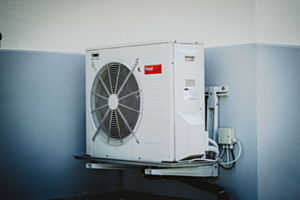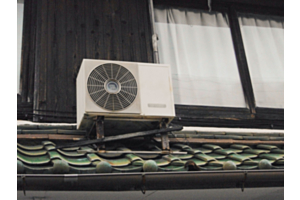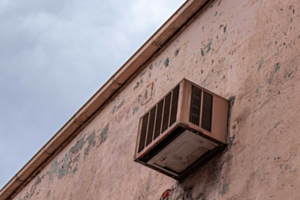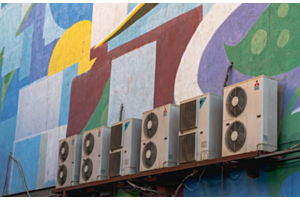Blog
-
June 27, 2023
It’s our duty to prioritize sustainable living and do our part to keep our ailing planet around for future generations.
You’ve made some significant lifestyle changes to create a greener home, and the next change on your to-do list is revamping your heating and cooling system. You recognize you have outdated HVAC that drags down your utility bills, so you’ve begun exploring alternatives.
You’re interested in switching over to a ductless mini split system. However, you’re unsure how eco-friendly these heating and cooling units are.
A ductless mini split is a great tool for a more sustainable home. Let’s examine the ways that mini splits are better for our planet.
Don’t Need as Many Raw Materials
A central air conditioner or furnace needs many vents or ducts. It’s expensive to procure these materials, but did you ever think of how the parts are made? They’re often imported, traveling by boat or plane to reach the manufacturing plant.
-
June 20, 2023
Mini split technology continues to push the boundaries of what’s possible, and customers benefit. Let’s review some of the latest innovations in ductless tech.
Compatibility with Wi-Fi
Admittedly, Wi-Fi is far from the new kid on the block, but mini splits have now caught up with most household tech in that they’re Wi-Fi-ready.
More mini splits are manufactured with Wi-Fi remotes. This internet-friendly remote enables you to set the temperature of your mini split even if you’re not in the same room.
Imagine knowing your bedroom will be hot because it’s early summer and you haven’t run the AC all day. You can turn it on in advance so the room is nice and chilly by the time you get upstairs to get changed after a long day of work.
Or, picture that it’s a cold winter day, and you want a toasty nook to settle down in and read a good book. You can use the mini split’s Wi-Fi remote to configure the temperature before you enter
-
June 13, 2023
A mini split costs several thousand dollars, and while the expense is usually contained in the four figures, a new system can sometimes cost five figures if you have specific heating and cooling needs or a large building or residence.
Paying upfront can be challenging for some customers, even if we keep our products affordably priced. That’s why PowerSave AC offers mini split AC financing with Affirm.
Affirm is a trusted name in finances. Their service allows you to purchase what you need now and pay for it later. The lack of late fees and other charges makes Affirm a trusted choice for millions of customers for all sorts of products and services, your ductless mini split among them.
How do you get started with Affirm? It’s easy. Select the “buy with Affirm” option when you’re checking out. You’ll then be redirected from PowerSave AC’s website to Affirm’s.
You’ll have
-
June 06, 2023
A ductless mini split is arguably the most energy-efficient cooling solution on the market, far more so than window air conditioners and even central cooling units. You’re interested in purchasing a mini split, but what types of mini split ACs can you choose from?
This succinct post will take you through your options so you can select one to provide the most optimal cooling in your home.
Ceiling Cassette Mini Split
A mini split’s indoor unit is considerably smaller than a window air conditioner. However, some customers want an indoor unit that’s as unobstructive as possible. We always recommend ceiling cassette mini splits to them.
These mini splits install higher on the wall near the ceiling (hence the name). They’re a less obvious solution that looks great in a bedroom, an office, a living room, or an entertainment room.
You can enjoy greater cooling without a bulky unit taking up space.
Floor-Mounted
-
May 30, 2023
You’ve spent months weighing your options and have decided a ductless mini split system is the right solution for you. You’ve even selected several brands you like.
As you’re on the cusp of a life-changing decision (in the best way possible), we put together this checklist so you can make a purchase you’re pleased with.
Here’s how to choose a mini split.
Zones
The first consideration is zones. A zone does not necessarily constitute the rooms in a building but is instead the parts of your home or commercial building that get colder or hotter than other spaces.
These zones can include above-ground and below-ground rooms like a basement or attic, a drafty room with old windows, or an upstairs bedroom that lacks ventilation.
The more square footage, the greater the number of zones in many cases. Single-zone units cover only one zone, but if you need a multi-zone mini split, you can select between three and eight zones.
-
May 23, 2023
2023 has been a banner year for you, as you’ve improved your home in many ways. One glaring omission is your heating and cooling systems. You have outdated HVAC units that you’ve longed to replace for years now.
You’ve heard good things about ductless mini splits, and you’re thinking now might be a good time to take the plunge since you’ve already changed so much about your home.
We agree! Here are some very inspiring reasons to consider a ductless mini split system for your home this year.
1. Ductless Mini Splits Last as Long as Your HVAC
The last thing you want to do after investing a significant portion of money into a new heating and cooling system is turn around in five or seven years and have to do it all over again. With a ductless mini split, you shouldn’t have those kinds of concerns.
Mini split systems can last on average the same duration as a traditional HVAC unit, including furnaces or heaters
-
May 16, 2023
After finding this blog, you’ve learned a lot about mini splits, enough that you’re reconsidering your current cooling and heating solution. However, you’re not sure when the right time is to get a ductless mini split system.
There truly isn’t any one particular right time. Rather, whenever you feel the time is right is when you should do it.
Of course, we’re sure you want more information than that to make an informed purchasing decision. That’s why we put together this list of questions to ask as you contemplate the timing of a ductless mini split system.
How Much Am I Paying for My Current Electric Bills? Is It Too High?
With inflation rising, everyone is feeling the vice grip of day-to-day living expenses more than ever before. If you can afford to lower any of your bills, why not do it?
High utility bills can be especially egregious, as you can shell out a lot of cash for electricity month after month.
You
-
May 09, 2023
A ductless mini split is an investment, and while it should last longer than traditional HVAC units, you still must maintain it and treat it with care. Part of that involves embracing inverter technology.
What exactly is an inverter in a ductless mini split system, and how does it affect the system’s longevity? We’ll answer those questions ahead, so make sure you keep reading!
What Is a Mini Split Inverter, Anyway?
Let’s begin by discussing what an inverter is in a ductless mini split system and how it works.
An inverter is a style of compressor. Before we can explain what that means, let’s make sure you’re clear on what a compressor is.
All ductless mini split systems use a compressor, sometimes also called a condenser. The compressor is the outdoor unit that pressurizes coolant, transforming it from a gas into a liquid.
The coolant or refrigerant can then travel
-
May 02, 2023
As the seasons change, you used to rely more on your air conditioner than heater or vice-versa. Now you have a mini split to provide heating and cooling. Even still, you’ve noticed seasonal performance shifts that have you wondering if something is amiss with your mini split or if it’s supposed to operate like that.
Well, the bad news? Seasonal changes will affect the efficiency of your mini split. The good news? This really only happens in extreme temperatures, and usually only extreme cold, at that.
So let’s talk temperature extremes, shall we?
Most ductless mini split units are designed to work in temperatures up to 115 degrees Fahrenheit. If you live in very warm parts of the country like Arizona, Texas, Nevada, or Tennessee, where the temperatures can easily reach this hot or hotter, it’s not like your mini split will just stop working.
However, it won’t work to its full performance potential. So what
-
April 25, 2023
Today, you can’t afford to forego paying attention to your carbon footprint. More so than ever, everyone has to do their part to preserve our planet for future generations.
As you’ve assessed how energy efficient your household is, you’ve landed upon your heating and cooling systems with much disdain. These units are energy-suckers. You’re considering switching to a ductless mini split system, but will that make a difference in the size of your carbon footprint?
The answer is yes, without a doubt.
You’ve begun to recognize that your HVAC units hog up energy. You see it every month on your utility bills. If you run the heat religiously throughout the winter and then never miss a summer’s day with your air conditioner, you rarely get a break from high utility bills.
Traditional HVAC is inefficient the older it is because it simply lacks the technology to be a green heating or cooling solution.
However, even if you own a brand-new heater or air conditioner,






